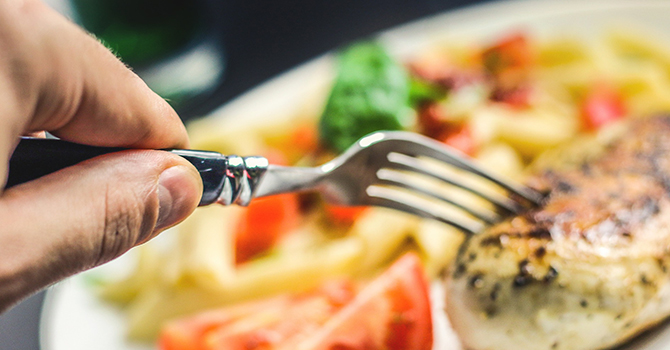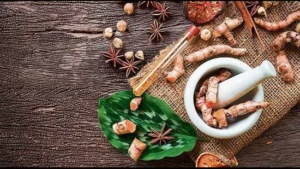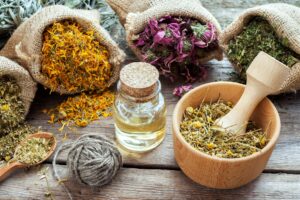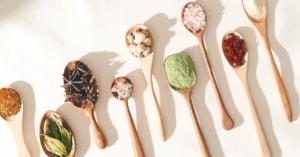
Craft herbal medicines easily from herbs you grow, harvest or find in nature with this easy-to-use guide for herbalism beginners. With simple recipes and remedies included herein, this introduction to herbalism helps aspiring natural healers flourish into natural healers!
Rosalee de la Foret, RH (AHG), provides essential guidance on determining dosage for yourself or others. Herb monograph labels will keep your home apothecary organized and beautiful.
Herbs for Children
Parents often turn to natural treatments for common childhood ailments like coughs, colds and stomachaches in their children. While supermarket and health food store shelves may contain herbal medicines that promise relief, dietitians unfamiliar with herbs often struggle with finding out which ones are safe and effective.
This book equips readers with all of the tools necessary to safely and effectively use herbs for their children. With an expanded herb identification section, a quick-reference guide of child-safe herbs, and new recipes galore – Herbs for Kids 3 has it all!
Utilizing herbs with children can be as straightforward as adding fresh herbs to their meals, teas or decocts (stronger herbal teas) and tinctures are great ways to provide medicinal ingredients to our young ones. Herbs that target respiratory conditions such as colds and flus such as thyme are antivirals while elderflower is known for relieving symptoms associated with coughs; antispasmodic remedies such as pelargonium and echinacea are great antispasmodic herbs which help ease symptoms such as these conditions – whether that means strengthening immune response or helping clear congestion by strengthening immune response and clearing congestion – examples include thyme which has powerful antiviral qualities while elderflower and elderflower can both aiding treatments; these antispasmodic medicines help relieve cough symptoms such as antispasmodic properties and relieve symptoms such as antispasmodic herbs used with children such as antispasmodic benefits and ease antispasmodic herbs like pelargonium or echinacea can ease symptoms associated with coughing by their antispasmodic properties allowing an antispasmodic action. Herbal teas made of decocts (stronger than tea) are also excellent antis and elderflower can be used against cold/flu symptoms; antispasmodic herbs can ease cough symptoms with ease of such antispasmodics can provide useful antis pelargonium/ echinacea; antisas to provide antispasmodics to ease cough symptoms through antispacia can ease its antis echinacea nature or antis echinacea act by strengthening immunity or help clear congestion relief which strengthen immune response by strengthening immune response strengthing immunity to clear congestion clearing congestion by strengthening immunity thus opening congestion;
Growing herbs with kids is an engaging way to introduce them to sustainable gardening and healthy eating habits, while expanding their knowledge about herbs. From ID games, science experiments, and cultural exploration activities – children may develop an enthusiasm for gardening that lasts throughout their lives!
Herbs for Women
Women have long been associated with plant lore and herbal healing remedies. From wise old women to housewives and midwives to healers, women knew which plants grew in their locality and how best to use them for health purposes – knowledge which has unfortunately been lost with the rise of orthodox medicine and male doctors dominating.
Herbal medicines can help women balance these changes throughout life and ease symptoms while aiding overall bodily function. For instance, evening primrose oil has been shown to ease hormonal fluctuations associated with menopause and perimenopause by improving sleep and decreasing hot flashes; additionally this herb increases progesterone levels while simultaneously decreasing prolactin, which may cause uterine contractions during gestation.
Additionally, this herb can help with anxiety and IBS by soothing histamine reactions, soothing stomach discomfort and aiding restful sleep. Furthermore, it acts as an natural stress buster by decreasing cortisol levels while simultaneously increasing dopamine – the feel-good hormone.
When purchasing herbal supplements, look for the Traditional Herbal Registration (THR) mark on their packaging to ensure you’re purchasing a regulated and quality product. When taking herbal medicines it’s wise to seek professional advice such as from your GP or pharmacist first in case any adverse interactions might occur with any existing medications you are currently taking; you should also report any side effects via their Yellow Card Scheme to ensure you can report these to MHRA in case of adverse side effects.
Herbs for Men
Men have unique health needs that herbal medicine can address effectively. Herbal remedies such as ashwagandha, rhodiola, saw palmetto and ginseng offer men tailored benefits designed specifically to their needs; such as increasing testosterone production and sexual performance while strengthening immunity systems.
Rhodiola is widely recognized as an adaptogen that can help the body manage stress and fatigue, supporting prostate health and urinary tract health as well as combatting chronic stress which has been linked with cardiovascular issues in men.
Ginseng can not only bolster immunity and increase libido, but can also help sperm health by stimulating its blood pressure, vessels and nitric oxide levels in the body. Furthermore, this supplement can even reduce symptoms of erectile dysfunction by changing these factors.
When purchasing herbal medicines, it is essential that the Traditional Herbal Registration mark (THR) be visible on their packaging. This demonstrates that they have been subjected to regulatory processes and met quality standards. Furthermore, working with an accredited herbal practitioner is highly recommended in order to select suitable herbs. It’s also essential that any prescription drugs be disclosed so your herbalist can offer guidance as some herbs could potentially interact with prescriptions medications; and give advice on how best to take your herbs safely.
Herbs for Elderly
Herbs for the elderly can take many forms, from supplements and herbal tea to home remedies. Their healing properties may help improve mental health and immunity while offering pain relief and relieving discomfort.
Herbal remedies are increasingly becoming a go-to choice among seniors due to their accessibility, affordability and anti-aging benefits. Prescription drugs can be expensive and require regular visits with doctors for refills – while herbal remedies provide cost-effective options that provide antioxidant support that help combat aging and promote longevity.
Many older adults interviewed for this study reported learning about herbs and their uses through traditional channels such as family and friends as well as more contemporary information sources like television programs (e.g. Eye on Health), magazines, and the Internet. Furthermore, many actively sought new information on herbal use to incorporate it into their everyday lives.
Herbal remedies often have fewer side effects than pharmaceutical drugs, making them an appealing option for seniors with multiple medical conditions and who may be sensitive to medication side effects. Furthermore, herbs can be combined with other treatments; aloe vera works well as an aid for digestion when combined with ginger; Rosemary reduces stress levels while supporting memory and concentration – something many elders struggle with daily.




